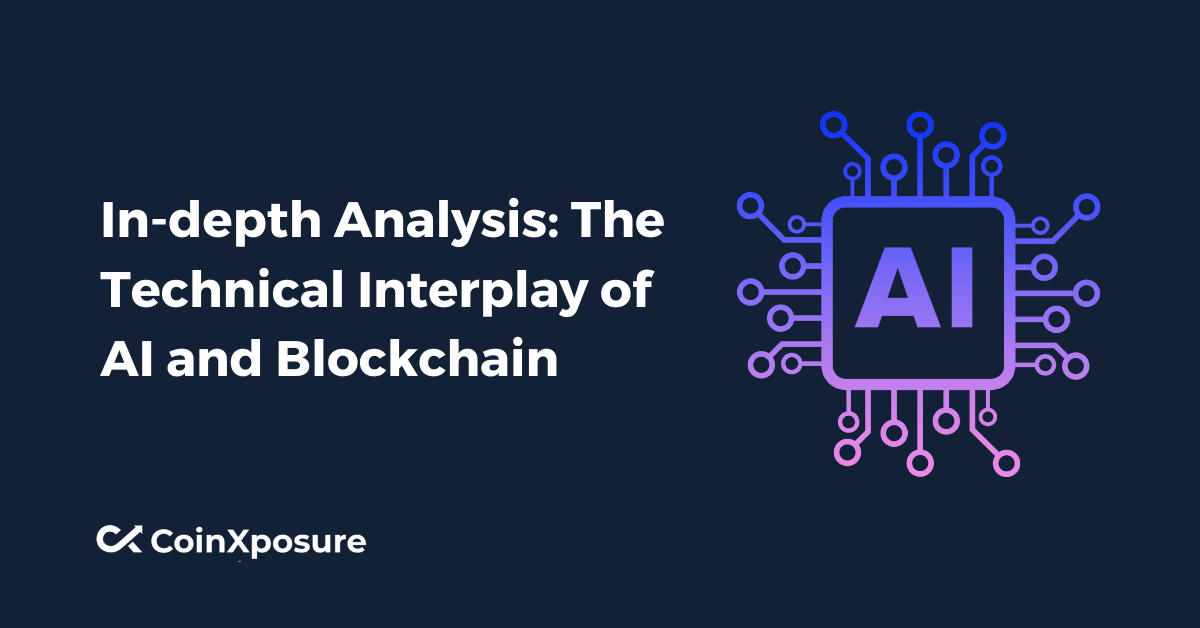The intersection of Artificial Intelligence (AI) and Blockchain has emerged as a captivating frontier, promising transformative possibilities across various domains.
This in-depth analysis delves into the intricate technical interplay between AI and Blockchain, exploring how these two cutting-edge technologies synergize to reshape the landscape of data management, decentralized decision-making, and the very fabric of innovation.
By unraveling the complexities of their integration, we aim to unveil the profound implications, challenges, and potential future trajectories that arise when AI and Blockchain converge.
AI in Blockchain
The infusion of Artificial Intelligence (AI) into Blockchain technologies marks a significant stride toward enhanced efficiency, autonomy, and intelligence within decentralized systems. This integration brings forth several key aspects:
- Smart Contracts and AI Algorithms
- Decentralized Autonomous Organizations (DAOs)
Smart Contracts and AI Algorithms
- Elevating the execution of smart contracts by integrating predictive analytics and learning algorithms.
- Enabling self-executing contracts that adapt based on real-time data and evolving conditions.
Decentralized Autonomous Organizations (DAOs)
- AI-driven decision-making processes within DAOs fostering quicker and more informed choices.
- Exploration of the challenges and opportunities arising from employing AI in the decentralized governance structures of DAOs.
In essence, AI in Blockchain amplifies the capabilities of decentralized systems, making them more adaptable, intelligent, and responsive to the dynamic nature of contemporary digital landscapes.
Blockchain in AI
The integration of Blockchain in Artificial Intelligence (AI) introduces novel dimensions to data security, privacy, and the collaborative development of intelligent systems:
- Data Security and Privacy
- Tokenization of AI Models
Data Security and Privacy
- Utilizing Blockchain for secure and transparent storage of AI-generated and training data.
- Enhancing privacy through decentralized control and permissioned access to sensitive AI-related information.
Tokenization of AI Models
- Representing AI models as tokens on the blockchain, enabling traceability and provenance.
- Implications for intellectual property rights and fostering collaboration by tokenizing AI assets.
This convergence offers solutions to critical challenges in the AI domain, addressing concerns related to data integrity ownership, and fostering a more collaborative and secure AI ecosystem.
Challenges and Risks of AI and Blockchain
The technical interplay of AI and Blockchain introduces notable challenges and risks, encompassing both technological and ethical dimensions:
- Scalability and Performance
- Ethical Considerations
Scalability and Performance
- Balancing the computational demands of AI algorithms with the inherent scalability limitations of blockchain systems.
- Addressing the challenge of accommodating real-time processing requirements, especially in scenarios with large-scale data and complex AI models.
Ethical Considerations
- Managing bias in AI models integrated with blockchain, ensuring fairness and transparency.
- Navigating ethical dilemmas related to the decentralized nature of decision-making and potential unintended consequences.
Navigating these challenges is imperative for the responsible development and deployment of AI and Blockchain solutions, requiring a nuanced approach that considers both technological advancements and ethical considerations.
Future Trends of AI and Blockchain
The future trends in the technical interplay of AI and Blockchain point toward exciting possibilities and ongoing advancements:
- Evolution of Synergy
- Impact on Industries
- Societal Implications
Evolution of Synergy
- Further refinement of the integration between AI and Blockchain, unlocking new synergies and capabilities.
- The emergence of innovative frameworks and protocols facilitating seamless collaboration.
Impact on Industries
- Widespread adoption across industries, with sectors such as finance, healthcare, and supply chain witnessing transformative changes.
- Increased efficiency and transparency through AI-driven blockchain solutions.
Societal Implications
- Shaping societal norms around decentralized decision-making and trust in AI algorithms.
- Influence on legal frameworks and regulations to accommodate the evolving intersection of these technologies.
As these trends unfold, the technical interplay of AI and Blockchain is poised to play a pivotal role in reshaping how we approach data, intelligence, and decentralized systems in the coming years.
Conclusion
The technical interplay of Artificial Intelligence (AI) and Blockchain unveils a dynamic landscape where decentralized systems and intelligent algorithms converge, offering unprecedented opportunities and challenges.
The synergistic relationship between these cutting-edge technologies can redefine how data is managed, decisions are made, and innovation flourishes.
While AI in Blockchain enhances smart contract execution, facilitates predictive analytics, and empowers decentralized autonomous organizations, Blockchain in AI ensures secure and transparent data storage, addresses privacy concerns, and tokenizes AI models for improved collaboration. However, this convergence is not without its challenges.
In navigating this transformative journey, stakeholders across industries, academia, and regulatory bodies must collaborate, innovate responsibly, and establish frameworks that ensure the ethical and sustainable evolution of the technical interplay between AI and Blockchain.
The intersection of these technologies represents not only a convergence of algorithms and ledgers but a gateway to a future where decentralized intelligence contributes to a more resilient and equitable global ecosystem.












